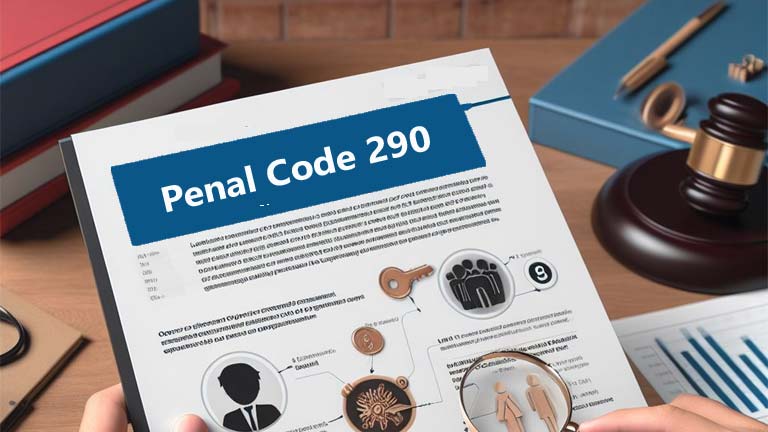
Navigating the legal landscape can be akin to deciphering a complex code. One such intricate piece of legislation that demands our attention is Penal Code 290. In this exploration, we will untangle the web of complexities surrounding this legal provision, shedding light on its implications and the nuances that often go unnoticed. So, read on to discover everything you need to know and seek professional legal help if you need more personal assistance.
The Basics: Decoding Penal Code 290
Let’s start with the fundamentals. Penal Code 290, commonly known as the sex offender registration law, has a profound impact on individuals convicted of certain offenses. Rather than a one-size-fits-all approach, it operates on a tiered system, classifying offenders into different categories based on the severity of their crimes.
Tier 1: The Low-Level Offenders
The first tier encompasses those whose offenses are considered less severe. These individuals are required to register as sex offenders for a minimum of ten years, with periodic check-ins to keep authorities informed of their whereabouts.
Tier 2: A Notch Higher
Tier 2 includes individuals convicted of more serious offenses. For this group, the registration period is extended to 20 years, again with regular reporting obligations. The stakes are higher, reflecting the gravity of their actions.
Tier 3: The Highest Level of Scrutiny
At the top of the hierarchy lies Tier 3, reserved for the most severe offenders. Those in this category face a lifetime obligation to register as sex offenders. The implications are weighty, shaping the course of their lives indefinitely.
The Human Side: Impact on Lives
Behind every legal provision, there are real lives, real stories. Penal Code 290, despite its legal framework, has a profound impact on the individuals it touches. Let’s delve into the human side of this legislation.
The Struggle for Rehabilitation
For many, the path to rehabilitation is fraught with challenges. Once branded with the scarlet letter of a sex offender, reintegration into society becomes a monumental task. Employment opportunities diminish, relationships strain and the pursuit of a normal life takes on an uphill battle.
Family Dynamics
The ramifications extend beyond the individual, affecting families and loved ones. The stigma attached to sex offender registration often casts a long shadow, testing the bonds that tie families together. Understanding and navigating this delicate terrain becomes imperative for all involved.
Legal Quagmire: Navigating Challenges
Penal Code 290 doesn’t merely end with the initial conviction. Legal battles, challenges to registration requirements, and the constant threat of public scrutiny create an ongoing saga for those ensnared in its web. The legal quagmire becomes a defining feature of their post-conviction journey.
Implications for Community Safety
While the human side is crucial, it’s equally important to recognize the intent behind Penal Code 290 – safeguarding communities. However, the effectiveness of this legislation in achieving this goal is a subject of ongoing debate.
Striking a Balance
Balancing the scales between protecting society and affording individuals an opportunity for redemption is a delicate act. Stricter registration requirements undoubtedly serve to monitor potential threats, yet the question lingers: at what cost to the rehabilitative prospects of the offender?
Public Perception
Public perception plays a pivotal role in shaping the effectiveness of sex offender registration laws. The fine line between caution and prejudice often blurs, leading to unintended consequences. Educating the public about the nuances of the law becomes essential in fostering a more informed and empathetic community.
Navigating the Gray Areas: Legal Critique
No legal provision is without its critics, and Penal Code 290 is no exception. As we unravel the complexities, it’s essential to acknowledge the gray areas that fuel the ongoing discourse.
Ambiguity in Offender Classification
The tiered system, while providing a semblance of differentiation, is not without its flaws. The ambiguity in classifying offenders into distinct tiers raises questions about the fairness and accuracy of such categorizations.
Rehabilitation as a Secondary Concern
Critics argue that the primary focus of sex offender registration laws should be rehabilitation rather than perpetual monitoring. Shifting the narrative from punitive measures to support systems could potentially reshape the outcomes for those seeking redemption.
Conclusion
In the tapestry of legal intricacies, Penal Code 290 stands as a complex thread. Its impact, both on individuals and communities, is undeniable. As we grapple with its implications, a nuanced dialogue that considers the human stories, legal intricacies, and societal dynamics becomes imperative. Only through understanding and empathy can we navigate the complexities of Penal Code 290 and, perhaps, pave the way for a more balanced and just legal landscape.




